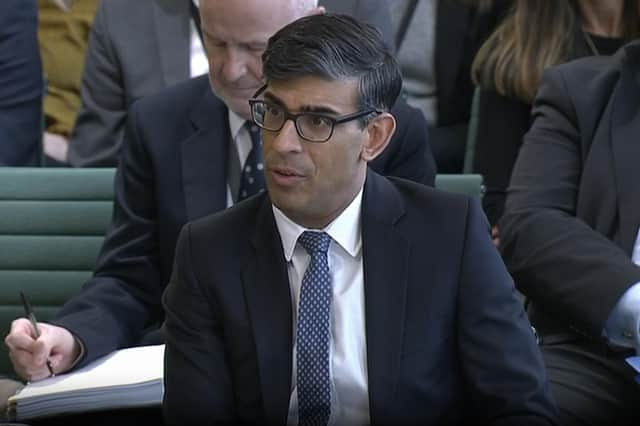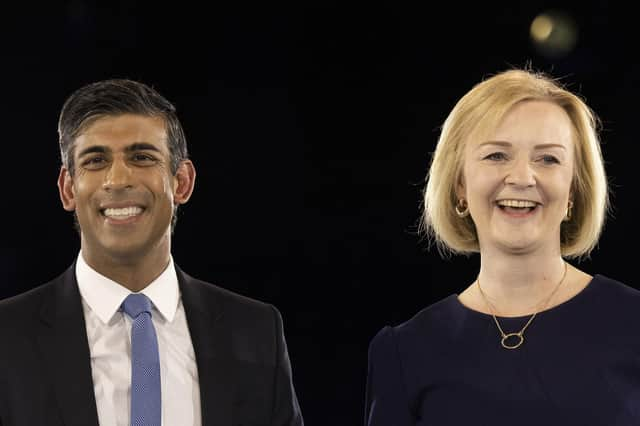From China to the deep state: five key takeaways from Rishi Sunak’s appearance at the Liaison Committee
and live on Freeview channel 276
Rishi Sunak has been grilled for hours by MPs in a testy session in front of the Liaison Committee.
He was asked about China, the Rwanda policy and even the deep state during the two-hour committee hearing. Unlike Prime Minister’s Questions, this was more about policy as opposed to rhetoric, and as such some of Sunak’s answers were very technical and detailed.
Advertisement
Hide AdAdvertisement
Hide AdNationalWorld’s Politics Editor Ralph Blackburn, based in Westminster, watched the whole hearing so you don’t have to. He’s picked out his five key takeaways from the MPs’ grilling of Sunak.
Sunak unsure about Budget leak inquiry
The Budget earlier this month was possibly the most briefed out fiscal event in history. Almost every major announcement, from alcohol and fuel duty to the 2p National Insurance cut, had been leaked to the papers in advance. Jeremy Hunt’s reform of child benefit was the only measure that caught journalists off guard.
Yet, at the Liaison Committee today, Rishi Sunak claimed to “deplore” leaks, but funnily enough could not recall whether a leak inquiry had been launched after the National Insurance cut was reported in the media.
He said: “I deplore these leaks, particularly around Budget measures. I suffered from them as Chancellor myself.” But added: “I can’t recall the specific situation around that leak inquiry…”
Advertisement
Hide AdAdvertisement
Hide AdIt was only a leak about the biggest fiscal event of the year less than a month ago. Surely the PM would know …
Sunak added: “In general leak inquiries are instituted when there is a leak of sensitive information. Obviously it has historically proved difficult to identify the culprits of those, but… it’s certainly not in the government’s interest to have sensitive Budget measures leaked in advance.”


Clash over asylum seekers ‘in limbo’
The Prime Minister clashed with Dame Diana Johnson, the chair of the Home Affairs Select Committee, over the 33,000 asylum seekers who arrived here by irregular means, such as small boat crossings. Johnson described them as in limbo, as they cannot claim asylum under the government’s Illegal Migration Act and are currently just waiting for the Rwanda Bill to pass to see if they will be sent to east Africa.
Sunak replied: “I wouldn’t characterise it as being in limbo. Anyone who arrives here illegally shouldn’t be able to stay, that’s the government and mine’s very clear position. We will do everything we can to remove them, either to their home country, if it’s safe to do so, or a safe alternative like Rwanda. There’s no limbo about it.”
Advertisement
Hide AdAdvertisement
Hide AdJohnson hit back: “They are in limbo at the moment because they can’t claim asylum and you’re unable to tell me how many of the 33,000 you think will go to Rwanda.” Sunak continued to dodge the question about how many of this group would go to the east African country.
UN resolution on a ceasefire in Gaza
Sunak was asked about the recent UN resolution which called for an immediate ceasefire in Gaza, which the UK voted for. Tory MP Stephen Crabb asked: “How is a ceasefire resolution, which contains not a word of condemnation of Hamas or any conditionality around hostage release, consistent with our previous position and the language you’ve previously used about Hamas being evil and needing to see them being militarily defeated?”
The Prime Minister said he could “appreciate concern on that point”, but added that the resolution is “close to our position but not a perfect replication of it”. Sunak explained that the ceasefire was conditional on the release of hostages. Crabb murmured that there’s “no incentive” for Hamas.


Spat about China
The Prime Minister got into a bit of a spat with the chair of the Business and Trade Select Committee, Labour MP Liam Byrne. Sunak was challenged on the government’s reluctance to act on a number of Chinese-owned companies such as Bytedance, which owns TikTok.
Advertisement
Hide AdAdvertisement
Hide AdHe rejected the suggestion from Byrne that while other nations acted to protect themselves against China, the UK was merely “thinking about it”. The PM said: “Our approach to China is undoubtedly more robust than, I’d say, most of our allies.”
He pointed to European countries not removing Huawei equipment from their telecommunications networks, not placing similar restrictions on exports of sensitive technology to China and said the UK’s foreign investment regime was the most recently implemented and therefore the most robust, among other examples.
He added: “I am entirely confident that our approach to dealing with the risk that China poses is very much in line with our allies and in most cases goes further in protecting ourselves.” At the end of his questions, Byrne shot back: “It clearly doesn’t.”
The deep state
A rare moment of humour came towards the end of the gruelling two-hour session. With a bit of a twinkle in his eye, Tory MP William Wragg asked the PM what he made of Liz Truss’ comments that she was thwarted by the “deep state”.
Advertisement
Hide AdAdvertisement
Hide AdSunak initially said that was a question for Truss, but Wragg persisted: “I’m keen to hear your view Prime Minister, is there a deep state, are you part of it, am I part of it?”
The PM repeated his answer before joking: “I probably wouldn’t tell you if I was … and we [Sunak and Wragg] wouldn’t tell anyone else either.” This caused laughter around the committee room - perhaps a sign of the hole Truss has gone down since leaving No10.
Ralph Blackburn is NationalWorld’s politics editor based in Westminster, where he gets special access to Parliament, MPs and government briefings. If you liked this article you can follow Ralph on X (Twitter) here and sign up to his free weekly newsletter Politics Uncovered, which brings you the latest analysis and gossip from Westminster every Sunday morning.
Comment Guidelines
National World encourages reader discussion on our stories. User feedback, insights and back-and-forth exchanges add a rich layer of context to reporting. Please review our Community Guidelines before commenting.
